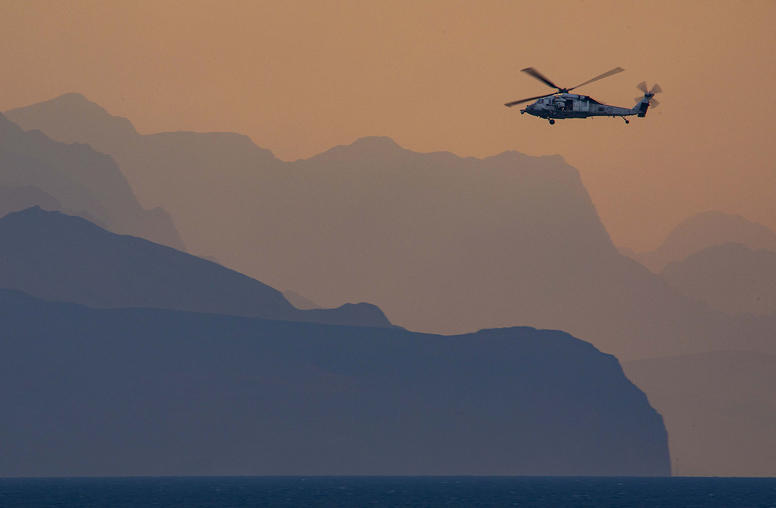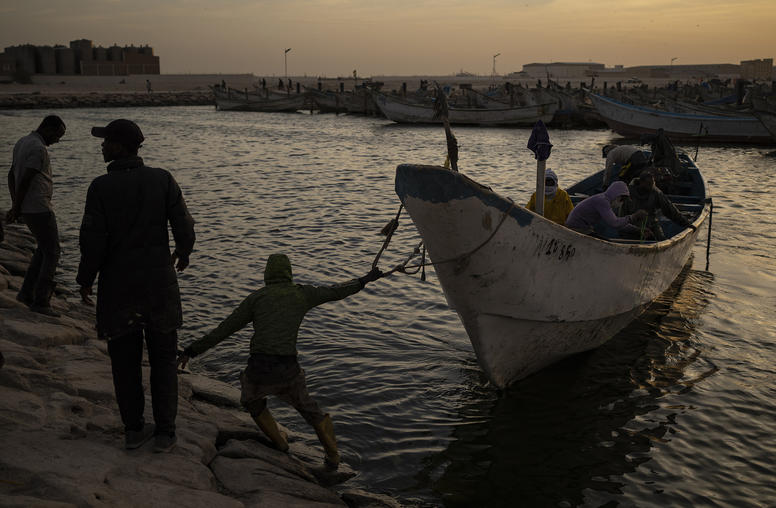Twitter Forum Explores Lawlessness at Sea
New York Times Reporter Ian Urbina, Experts Discuss “Outlaw Ocean” Series
The unreported murder of four men in plain view, all too common on the high seas, led New York Times reporter Ian Urbina into the merciless world that resulted in his investigative series, "The Outlaw Ocean." In an event hosted by the International Network to Promote the Rule of Law (INPROL) and USIP on Aug. 18, Urbina and a panel of experts convened from three continents for a virtual forum on Twitter to discuss the issues and impact of lawlessness at sea.
Using the hashtag #OutlawOcean, the discussion explored the problems of weak international and domestic legal frameworks governing maritime spaces, impunity and corruption within global supply chains, and rights abuses such as trafficking in persons and slavery. A Twitter interview with Urbina was followed by a conversation with experts from The Global Initiative Against Transnational Organized Crime, Sea Shepherd, Solidarity Center, the U.S. Department of State, the U.S. Naval War College, and USIP.
@OutlawOcean What did video reveal about the state of the #oceans, why report on it? http://t.co/0BKxeE0Jw6 #OutlawOcean #ruleoflaw — INPROL (@INPROL) August 18, 2015
@INPROL #outlawocean The video showed a Mad-Max brutality that exists at sea, that murder can occur with impunity, that investigations (1)
— Outlaw Ocean (@OutlawOcean) August 18, 2015
@INPROL #outlawocean are tough to do, that countries often are more interested to verify no connection to the crime than they are to (2)
— Outlaw Ocean (@OutlawOcean) August 18, 2015
@INPROL #outlawocean actually solving it. That's what we learned investigating that video. We also just thought it so egregious (3)
— Outlaw Ocean (@OutlawOcean) August 18, 2015
@INPROL #outlawocean that it felt like it demanded attention. So we wanted to cover it. (4)
— Outlaw Ocean (@OutlawOcean) August 18, 2015
Questions came in from around the world as #OutlawOcean audiences joined the conversation.
Did you at any time feel that your safety was endangered in the course of your investigation? #OutlawOcean — Mercedes Rosello (@MercedesRosello) August 18, 2015
.@MercedesRosello I felt a little at risk while we were on land chasing migrants who had escaped fishing vessels. This was in Borneo and (1)
— Outlaw Ocean (@OutlawOcean) August 18, 2015
.@MercedesRosello along the Thai-Myanmar border. Some of these deckhands were hiding out from traffickers and we had been warned that the(2)
— Outlaw Ocean (@OutlawOcean) August 18, 2015
.@MercedesRosello traffickers were not particularly nice fellows. On the ships, I didn't feel at risk from assault from crew or officers (3)
— Outlaw Ocean (@OutlawOcean) August 18, 2015
.@MercedesRosello They sort of viewed us with puzzlement and so long as we stayed out of their way, they didn't mind our presence. (4)
— Outlaw Ocean (@OutlawOcean) August 18, 2015
Most people think Captain Phillips when hearing about #outlawocean - what else should we know about? — Allie Bernstein (@A11ieCat) August 18, 2015
.@A11ieCat While I think Capt. Phillips movie is great and it threw a lot of attention on one category of violence at sea. I also think (1)
— Outlaw Ocean (@OutlawOcean) August 18, 2015
.@A11ieCat it really gave a false impression in its focus on one type of assaults that happen out there. The targets of Somali piracy (2)
— Outlaw Ocean (@OutlawOcean) August 18, 2015
.@A11ieCat tend to be western interests, deeper pockets and that is why there was a major global response. But there is far more and much(3)
— Outlaw Ocean (@OutlawOcean) August 18, 2015
.@A11ieCat of it far more brutal that targets smaller vessels and those crews are routinely kidnapped and/or killed and this realm (4)
— Outlaw Ocean (@OutlawOcean) August 18, 2015
.@A11ieCat .@A11ieCat of violence rarely gets tracked, counted or a global reaction. #outlawocean @INPROL @USIP (5)
— Outlaw Ocean (@OutlawOcean) August 18, 2015
@OutlawOcean Is monitoring & prosecuting hard bc countries R unclear where their laws R applicable or is it apathy/disinterest? #OutlawOcean — Meredith Shea (@meredithashea) August 18, 2015
.@meredithashea The lack of investigation and prosecution is what sociologists often call an "over-determined" phenomenon. (1)
— Outlaw Ocean (@OutlawOcean) August 18, 2015
.@meredithashea In other words there are lots of reasons all reinforcing each other toward the same end: maritime law is complicated (2)
— Outlaw Ocean (@OutlawOcean) August 18, 2015
.@meredithashea & a refined field mastered by few, countries often dont have a clear sense of their responsibilities (3)
— Outlaw Ocean (@OutlawOcean) August 18, 2015
The first question in the open forum came from Twitter user @SCheneyPeters:
How much of #OutlawOcean lawlessness stems frm lack of legal framework vs lack of capacity to enforce? Great question via @SCheneyPeters
— INPROL (@INPROL) August 18, 2015
.@INPROL @SCheneyPeters @JamesKraska lack of capacity is profound
— James Kraska (@JamesKraska) August 18, 2015
.@INPROL @SCheneyPeters: A lot current complex #legal framework provides little incentive for anyone to prosecute. #OutlawOcean.
— Global Initiative (@GI_TOC) August 18, 2015
@GI_TOC Enforcement officials may not recognize labor abuses if their mandate only extends to product, not workers #outlawocean
— Kendra Kreider (@kendralkreider) August 18, 2015
#OutlawOcean We have all the required laws in the Sea just not the political or economical will to enforce them re environmental laws
— Omar Todd (@OmarSeaShepherd) August 18, 2015
.@INPROL @SCheneyPeters Honestly, I think the answer here is both. The laws are overlapping and many of them have, (1)
— Outlaw Ocean (@OutlawOcean) August 18, 2015
.@INPROL @SCheneyPeters as @JamesKraska has called it "structured ambiguity" built in which serves the purpose of leaving countries (2)
— Outlaw Ocean (@OutlawOcean) August 18, 2015
.@INPROL @SCheneyPeters wiggle room (and allows for consensus in the drafting of these rules/laws). At the same time some of the laws (3)
— Outlaw Ocean (@OutlawOcean) August 18, 2015
.@INPROL @SCheneyPeters are indeed quite clear but there is a true lack of anyone able or interested to police them. There are even few (4)
— Outlaw Ocean (@OutlawOcean) August 18, 2015
.@INPROL @SCheneyPeters (for lack of a better term) plaintiffs to demand that they be enforced. By that I mean, when a poor Sri Lankan (5)
— Outlaw Ocean (@OutlawOcean) August 18, 2015
.@INPROL @SCheneyPeters fishermen is killed by a cargo ship collision, or a undocumented, indentured Burmese deckhand is killed (6)
— Outlaw Ocean (@OutlawOcean) August 18, 2015
.@INPROL @SCheneyPeters by his captain or a Tanzanian stowaway is killed by a crew, who really is going to pressure the flag state (7)
— Outlaw Ocean (@OutlawOcean) August 18, 2015
.@INPROL @SCheneyPeters registry to hand over the information needed to bring justice? Who is going to have the resources to pressure (8)
— Outlaw Ocean (@OutlawOcean) August 18, 2015
Our experts covered issues ranging from corruption and organized crime to the failure to enforce the many laws that are actually on the books, as well as regulatory loopholes and technical capacity gaps at sea and at port.
Lack of political will, corruption, insufficient training for officials' contributes to inadequate enforcement and impunity. #outlawocean — Kendra_TIP Office (@kendralkreider) August 18, 2015
I only see a global solution under the only apparatus we have with is United Nations to manage all affairs at Sea & enforce (1) #OutlawOcean — Omar Todd (@OmarSeaShepherd) August 18, 2015
.@murfrog Across different transnational crimes prosecution is a challenge. Usually u need one highly motivated state to lead #OutlawOcean
— Global Initiative (@GI_TOC) August 18, 2015
@SCheneyPeters @OutlawOcean @INPROL @USIP my view: all states want info, but no one wants to pay for it; flag states free ride on commons.
— James Kraska (@JamesKraska) August 18, 2015
Corruption vulnerabilities in maritime security need to be addressed to help combat trafficking, illegal fishing #OutlawOcean 2/n
— James Cohen (@JamesCohen82) August 18, 2015
@OutlawOcean Corporations buying seafood tainted w/#forcedlabor must have accountability too #OutlawOcean @SolidarityCntr #whobenefits
— Neha Misra (@Nmisra05) August 18, 2015
The 13th United Nations Crime Congress in Doha was a first step in consolidating national level political will. Two months later in June 2015, the UN General Assembly adopted a resolution to develop a new legally binding treaty for conservation of marine life beyond national borders. With national and international bodies charting a course toward protecting the oceans as a global common good, it will take the combined efforts of practitioners across the rule of law, governance, security, and environmental sectors to bring order and accountability to its outlaws.
Take a look at the full conversation on Twitter via #OutlawOcean, and follow @ian_urbina and our experts for more on maritime-related issues.
Next steps for #OutlawOcean? How can practitioners across spectrum create meaningful change in #maritime regulation/enforcement? #ruleoflaw
— INPROL (@INPROL) August 18, 2015



